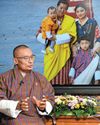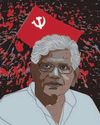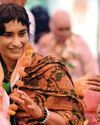
Harappa, or the mature Indus Valley Civilisation (IVC), spread over 2600 and 1900 BCE, is considered one of the largest urban societies of its time. Dholavira in Gujarat, Mohenjo Daro in Sindh and Rakhigarhi in Haryana were some of its major centres. In infrastructure like town planning and drainage systems, the IVC was second to none. It is considered largely peaceful, cosmopolitan, with distant trade ties, and no outward, overarching influence of religion. The burial sites at Rakhigarhi were austere, lacking the garishness of its close contemporaries like the Mesopotamian civilisation. It was one of those sites that yielded I6113—the woman whose 4,000-year-old remains yielded the genetic evidence necessary for a recent breakthrough in research on early Indian society. Two new, revelatory studies published on September 6 in the US journals Cell and Science throw light on the topic of ancient Indians.
This story is from the {{IssueName}} edition of {{MagazineName}}.
Start your 7-day Magzter GOLD free trial to access thousands of curated premium stories, and 9,000+ magazines and newspapers.
Already a subscriber ? Sign In
This story is from the {{IssueName}} edition of {{MagazineName}}.
Start your 7-day Magzter GOLD free trial to access thousands of curated premium stories, and 9,000+ magazines and newspapers.
Already a subscriber? Sign In

Themes Of Choice
As Savvy Investors Seek New Avenues, Thematic Mutual Funds Are Gaining Popularity

A golden girl
One of India's most formidable beauties passed away earlier this month. The odd thing is she would absolutely hate this obituary; she hated being written about and avoided publicity for all of her nine decades. Indira Aswani was 93 when she died. But anyone who encountered her, even briefly, was in such awe of her grace and poise, and one could not but remember her forever.

The interest in wine is growing delightfully in India
The renowned British wine writer and television presenter Jancis Robinson, 74, recently came to Delhi and Mumbai to reacquaint herself with India's wine industry. This was the Robinson's fourth visit to India; the last one was seven years ago. On this trip, Robinson and her husband, restaurateur Nicholas Lander, were hosted by the Taj Hotels and Sonal Holland, India's only Master of Wine.

United in the states
Indian-Americans coming together under the Democratic umbrella could get Harris over the line in key battlegrounds

COVER DRIVE
Usage-driven motor insurance policies offer several benefits

GDP as the only measure of progress is illogical
Dasho Karma Ura, one of the world's leading happiness experts, has guided Bhutan's unique gross national happiness (GNH) project. He uses empirical data to show that money cannot buy happiness in all circumstances, rather it is family and health that have the strongest positive effect on happiness. Excerpts from an interview:

India is not a controlling big brother
Prime Minister Tshering Tobgay considers India a benevolent elder sibling as the \"big brotherly attitude\" is happily missing from bilateral ties. He thinks the relationship shared by the two countries has become a model of friendship not just for the region, but for the entire world. \"India's attitude is definitely not of a big brother who is controlling and does not allow the little brother to blossom and grow,\" says Tobgay in an exclusive interview with THE WEEK.

Comrade with no foes
Lal Salaam, Comrade Yechury-you were quite a guy!

Pinning down saffron
In her first political bout, Vinesh Phogat rides on the anti-BJP sentiment across Haryana

MAKE IN MANIPUR
Home-made rockets and weapons from across the border are escalating the conflict